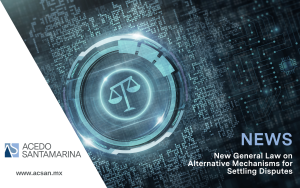
On July 6 of this year, the Chief Justice of the Supreme Court of Justice of the Nation (SCJN), Arturo Zaldívar, presented in the Senate the draft of the General Law to Prevent, Investigate, Punish and Remedy Feminicide. At first glance, it may seem that a project that contributes to solving the great problem in Mexico, where officially three women are murdered every day[1], may be valuable. Of course, the issue of femicides in Mexico is one of the major problems we face as a society and it is necessary that all authorities, within the scope of their powers, collaborate to solve the situation that Mexican women live day by day. However, the purpose of this text is not to analyze the substance of the bill, but rather to analyze what it really means for a SCJN minister to formulate a bill.
First of all, we must remember that, according to Article 40 of the Political Constitution of the United Mexican States, we are constituted as a representative, democratic, secular and federal Republic[2]. Derived from the democratic system we have adopted as a country, it is undeniable that one of the fundamental pillars of this system is the principle of the division of powers enshrined in Article 116 of the Constitution[3], since this principle implies the limitation of public power to prevent its abuse by the authorities.
This idea of delimiting power has been around for centuries, since philosophers and thinkers such as Aristotle, Bodin, St. Thomas Aquinas, John Locke and Montesquieu. It has been enriched and transformed into the current division of powers that we have today: Executive, Legislative and Judicial.
Currently, the principle of division of powers is no longer conceived only as a limitation on power to prevent its abuse, but now it is a complex system of weights and counterweights so that the exercise of public power serves as an instrument for the achievement of the common good of society.
Specifically, the function of the judiciary is to impart justice, interpret laws, resolve disputes arising between individuals, intervene in disputes that arise when a law or act of authority violates individual guarantees, resolve disputes between authorities, etc. In a few words, we could summarize all these powers in: the protection of the constitutional legal order.[4] The Constitutional Court of Justice is the body that is responsible for the protection of the legal order.
On the other hand, Article 71 of our Constitution is clear in delimiting who has the right to initiate laws and decrees[5]. It is not found in any of its sections that the right to initiate laws is vested in a member of the judiciary. This is logical because how can we explain that the body in charge of applying and interpreting a law is the same one that creates it? Wouldn’t your interpreting work and especially your impartiality be affected?
If the principle of division of powers, from its conception, was intended to prevent public power from being concentrated in a single body or person, as was the case in absolute monarchies, where the monarch created the laws, interpreted them and applied them. That is what we would come back to if a member of the federal judiciary, in addition to the power to impart justice, grants himself the power to legislate.
Now, what would happen if the aforementioned bill is enacted and an action of unconstitutionality is filed against this law? It is evident that if, at the beginning, the bill comes from the same body that is charged with studying whether there is a contradiction between the norm and the Constitution, we can at least say that its study will be biased.
It is worth mentioning that the Presiding Judge has excused himself on the grounds that his actions do not violate the constitutional legal order, since he is only formulating a draft, not a legislative initiative. Regarding the above, it must be said that regardless of the name it may be given, what it is doing is legislating, a power that is not granted to it by our Constitution, thus violating the principle of legality and the division of powers.
In conclusion, the defense of constitutional supremacy and the principles contained therein is a task of vital importance, since we are all concerned that public power be limited; otherwise, we are left to the discretion and good will of the rulers, a matter that historically we have proven does not work. Constitutionalism as a doctrine of checks and balances to limit the exercise of power, although it could be improved, is the system we have adopted as the governed and must always be respected by the authorities themselves in the exercise of their functions.
[1] https://www.unioncdmx.mx/2022/03/08/estadisticas-de-feminicidios-en-mexico-2022-cuantas-mujeres-son-asesinadas-al-dia/
[2] Article 40. It is the will of the Mexican people to constitute a representative, democratic, secular and federal Republic, composed of free and sovereign States in all matters concerning their internal regime, and of Mexico City, united in a federation established according to the principles of this fundamental law.
[3] Article 116. The public power of the states shall be divided, for its exercise, into Executive, Legislative and Judicial, and no two or more of these powers may be combined in a single person or corporation, nor may the legislative power be deposited in a single individual.
[4] Suprema Corte de Justicia de la Nación. (2005). What is the Federal Judiciary? (4.a ed.). General Direction of the Coordination of Compilation and Systematization of Theses of the Supreme Court of Justice of the Nation.
[5] Article 71. The right to initiate laws or decrees is vested:
I.To the President of the Republic;
II.To the Deputies and Senators of the Congress of the Union;
III. To the Legislatures of the States and of Mexico City; and
IV. To citizens in a number equivalent, at least, to zero point thirteen percent of the nominal list of electors, under the terms established by law
Alejandro Mariano Jiménez Rojas
Law Clerk





